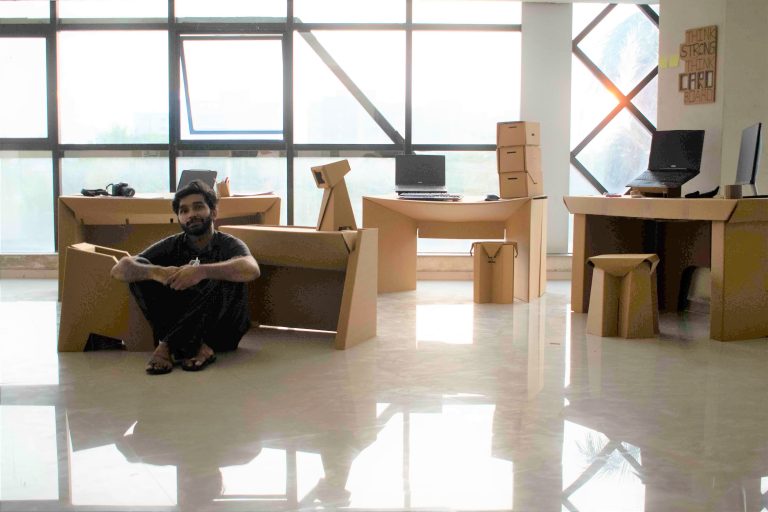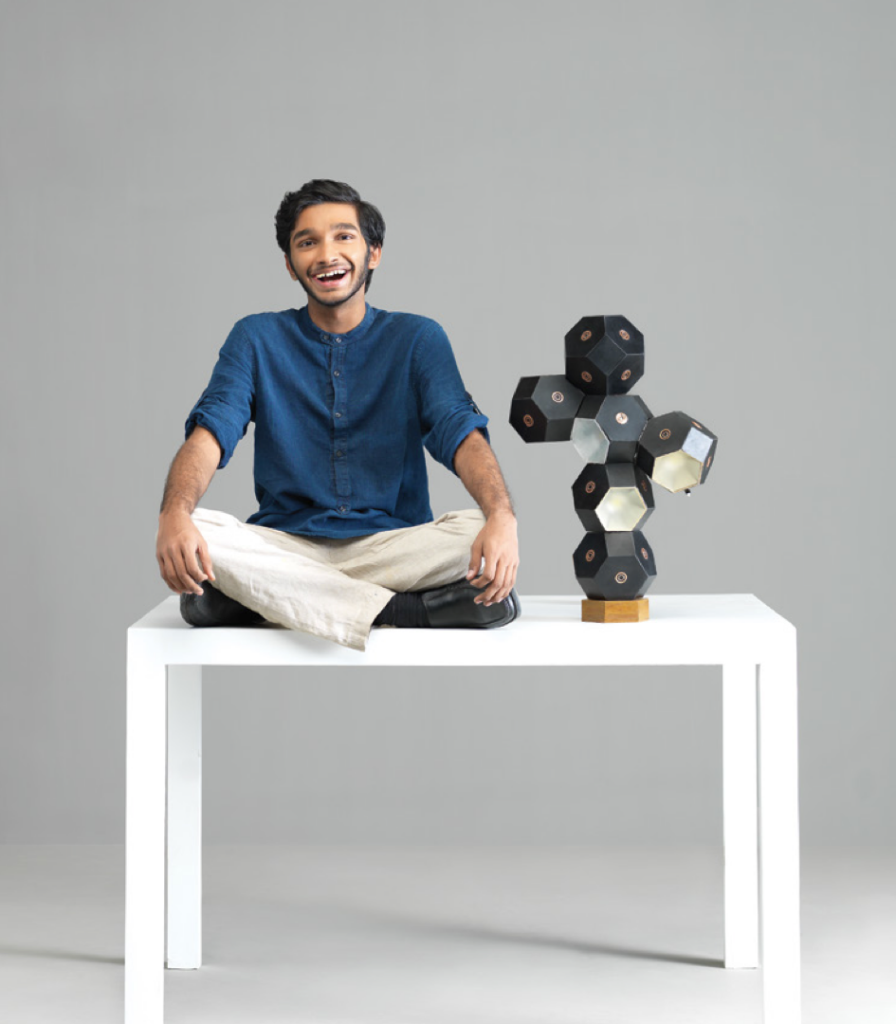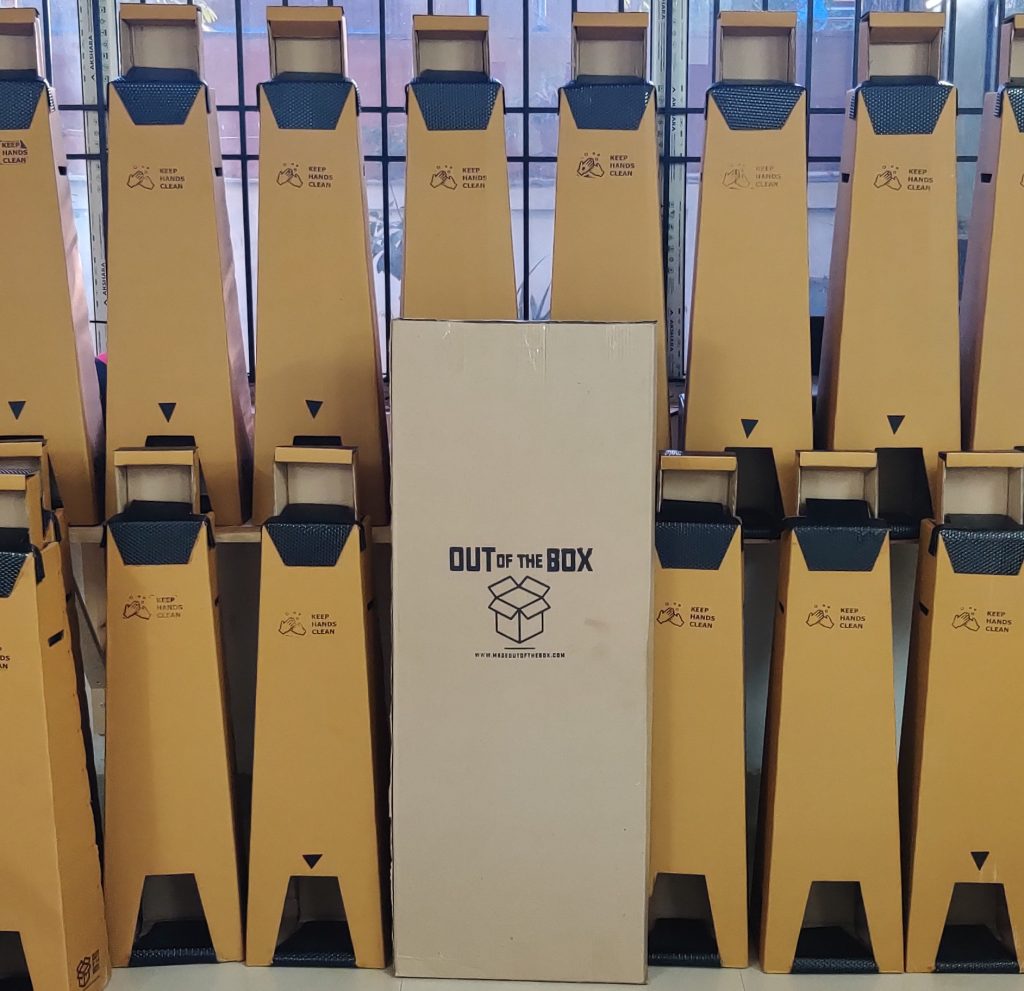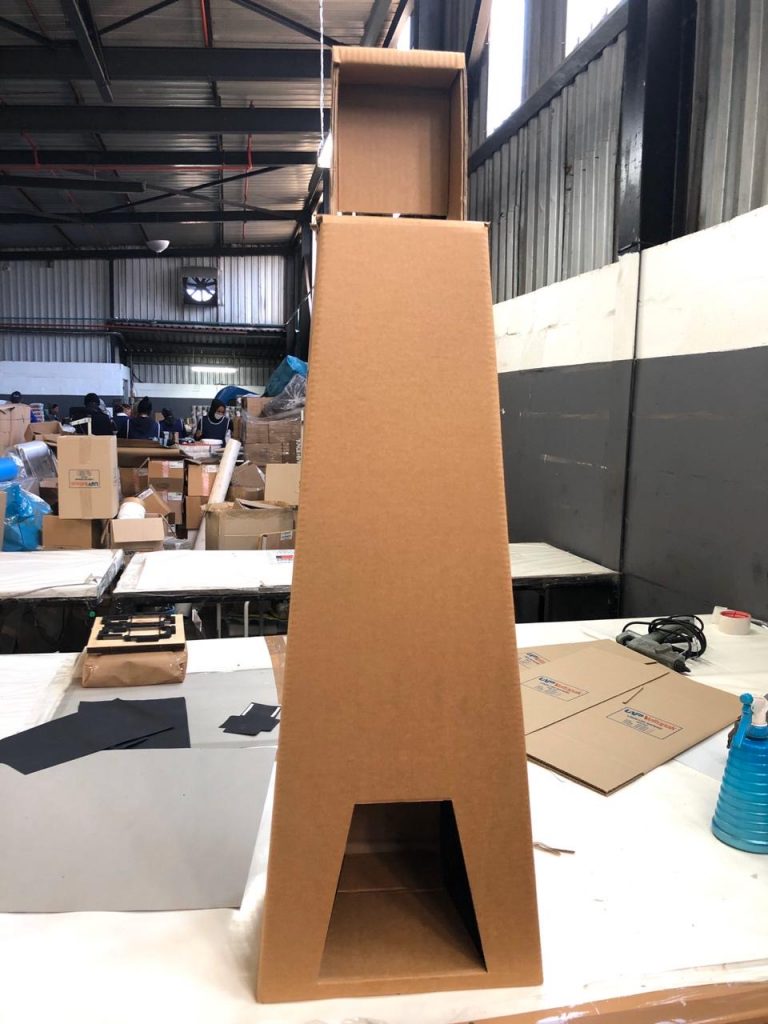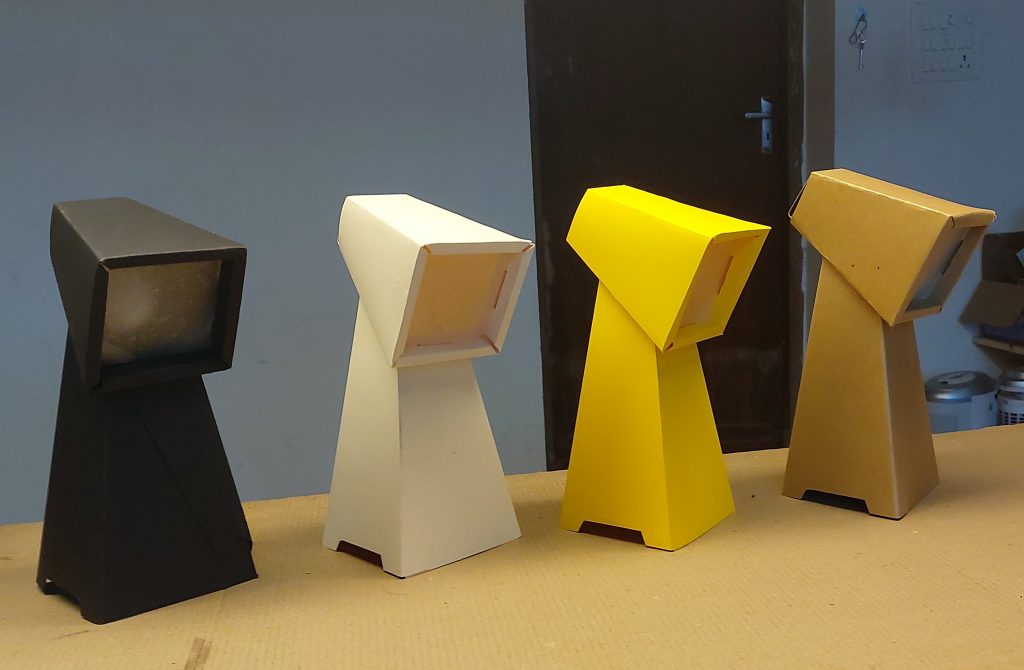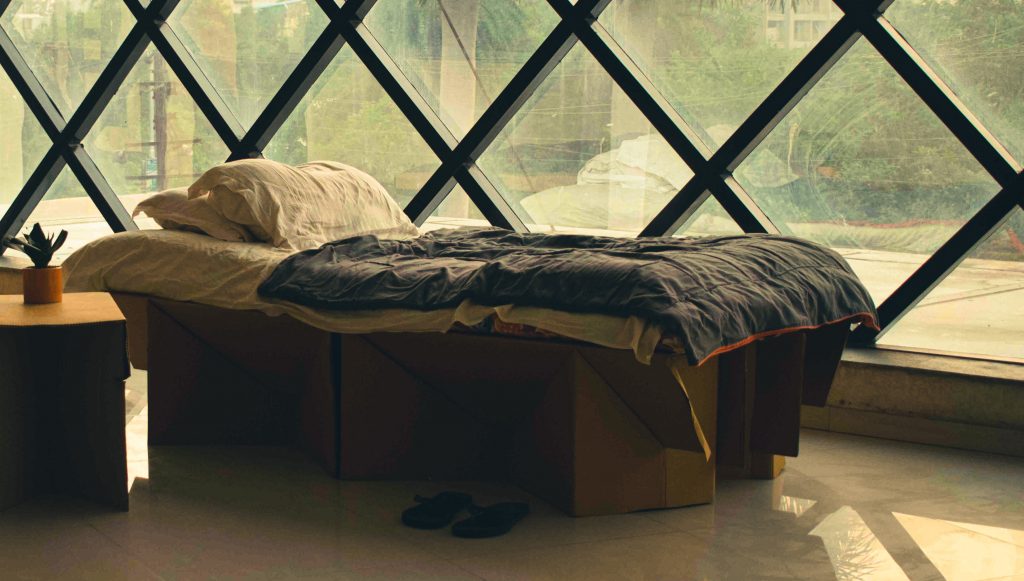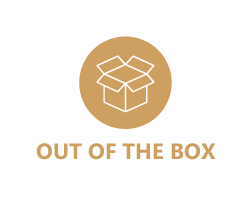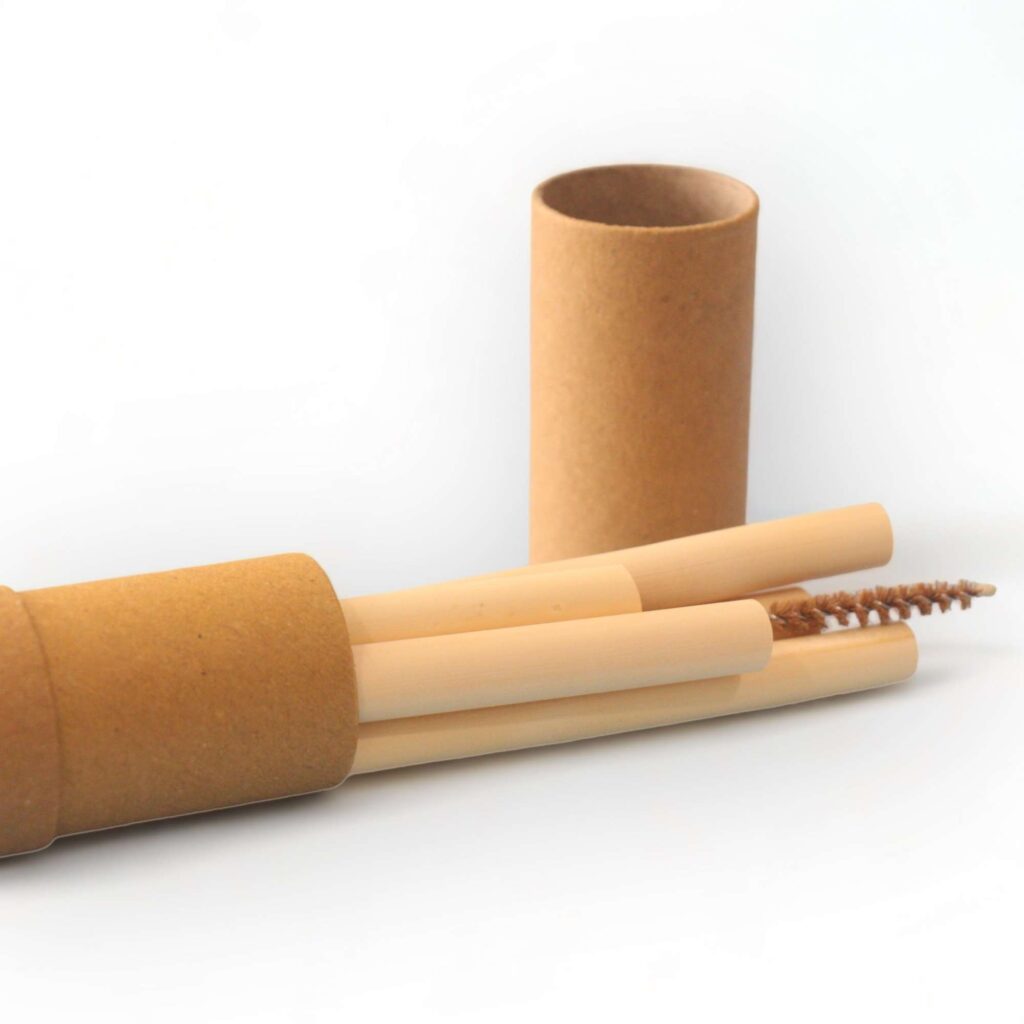Almost everyone has lived on a student budget at some point. In 2019, 3rd year product design student, Karthic Rathinam’s life was no different. That was the year he decided to rent a studio apartment in Pune, near his college, as he had to move out of his hostel. The rest of his money would go into food and transport or furnishing his apartment. He was sitting in his empty room surrounded by cardboard boxes, containing all of his belongings, when he had an epiphany.
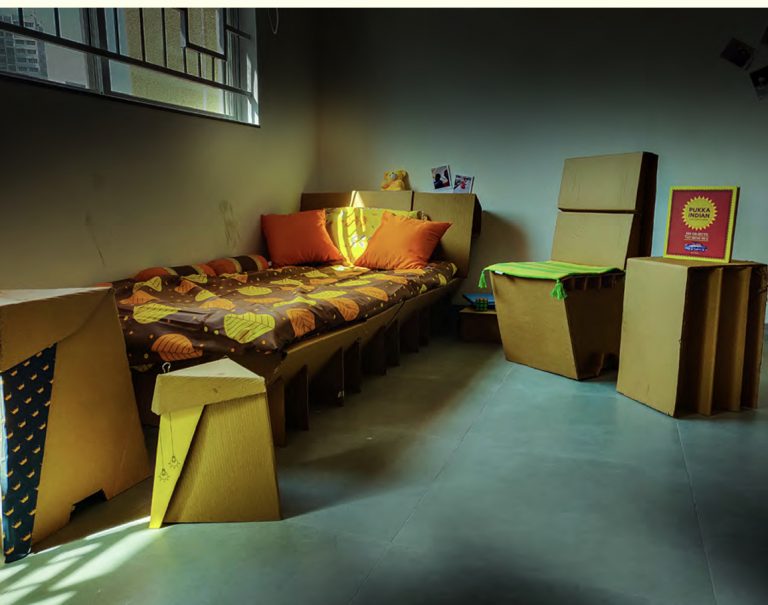
With his three years of experience designing products, he decided to make his own furniture using the cardboard that surrounded him. “So that’s how I started. I made a bed, and I slept in the bed for one and a half years.” Karthic recalls laughing, “And during that time I learned a lot about cardboard – how it works, structural properties and everything.”
After spending a lot of time in college experimenting and acquainting himself with the material, Karthic decided to cut short his five year degree and moved back to Chennai, just in time for the statewide lockdown due to the pandemic.
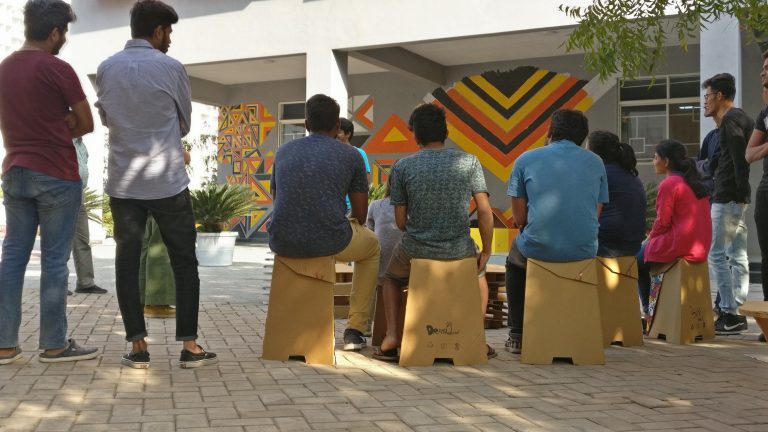
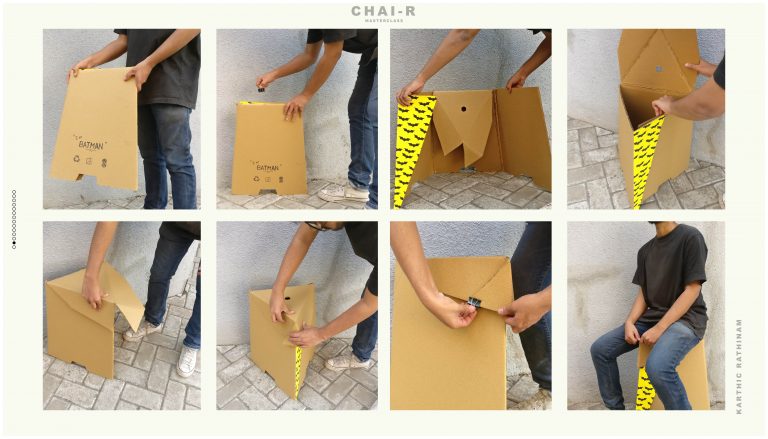
It was around June 2020 that the restrictions due to the first wave of the pandemic were slowly being lifted and people were looking for ways to reopen their business and gathering spaces while still being careful about personal hygiene. The stainless steel hand sanitizer stand became a popular contraption and was sold at the range of Rs.2,000 to Rs.2,500. He noticed that homes and offices were looking for cheaper and more temporary options and took a week to design an alternate mechanism out of cardboard.
He quickly kickstarted his venture noticing the opportunity and named it Out of the Box (aptly describing the nature of his products, whichever way it is interpreted.) “I didn’t know what problems I was going to face because I’d never sold anything per se,” he admits, “When I launched, the response was great. Everyone wanted it, but I just made one single prototype. I didn’t know how to make it a ‘mass thing’. I thought I’d get 10-15 orders and then I’d just cut it out by hand and give it to people. But no, I got around 1,500 orders in the first week and it was super scary! So then I went searching for manufacturers.”
The challenge didn’t end there, in fact they were further magnified due to the lockdown restrictions. Besides the difficulties with remote product management and logistics due to the 50% workforce allowance, it also turned out that shipping costs were higher than the actual cost of manufacturing the product (which was only about Rs.150-Rs.200.) These led to a delay while trying to fulfill an order for 3,000 stands priced at Rs.500 each. Over time these issues were resolved and his product was available to the whole country.
He then released a promotional video describing the product set-up and use, which went viral and brought in requests from London, South Africa and Dubai. Of these, a customer from South Africa had an intriguing request. He wanted to start manufacturing the cardboard sanitizer and sell it in all of the 54 countries in the continent. After rigorous discussions with his lawyer about patents and intellectual property rights, Karthic decided to sell his design to them with a 10% royalty charge. The product was rebranded as ‘Made of Box’ and 10,000 pieces were sold across the continent.
Around this time he noticed that around 8-9 manufacturers based in India were replicating his ideas and trying to make profits because it was cheap and easy to manufacture. “There is no Design Act in India to protect your design and patents don’t help with innovation. People can just change a little bit and make it their design. That was a little problematic,” he explains, stating the impact that design laws have had in innovation in Europe, China and the US.
Having started a cardboard revolution with a rapidly growing following, he decided to venture into other products. With the funds raised from sales in Africa, in November, with a team of 4 designers and 2 content writers, he set up a second office in Vapi, Gujarat, the Paper Capital of India.

The team in Vapi worked on research and development for about four months. They not only worked on exploratory design and testing of 53 new products but also found ways to increase the value of the product based on the large amount of feedback received from the brand’s early customers who bought the sanitizer stand. The first hurdle that was crossed through intensive research was getting rid of the material’s inherent unpleasant odour. The second was experimenting with colour printing on top of the material to alter its aesthetic that could also potentially be used for branding during events. The third was of the highest priority. They found a solution that would make the material water and oil proof (allowing one to spill coffee and wipe it clean, just like in the cleaning ads), thereby increasing the life of the product.
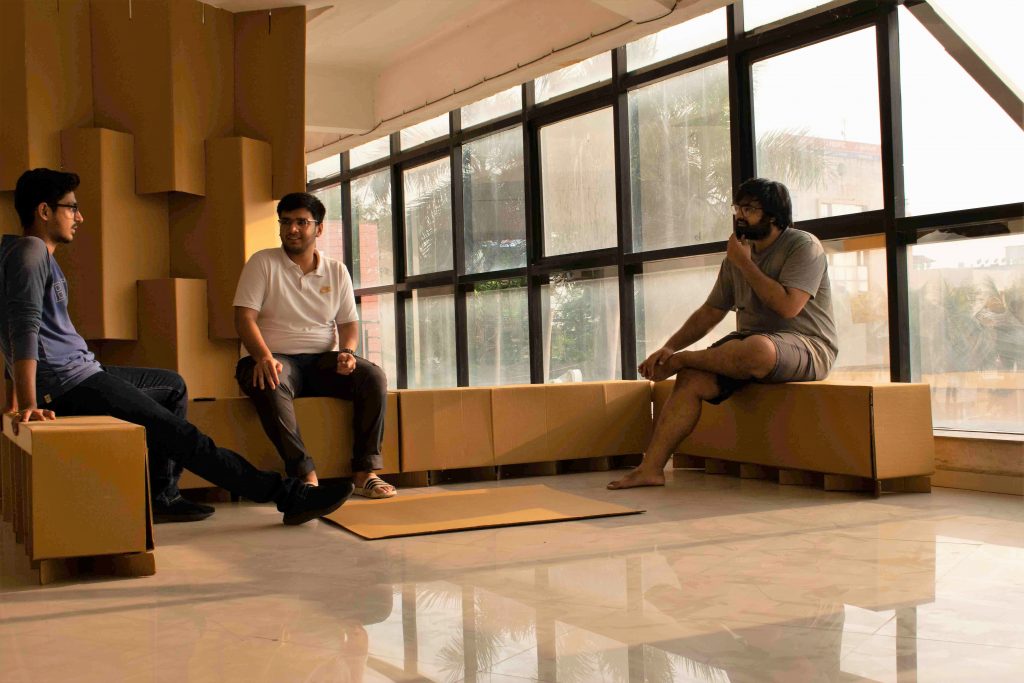
As a brand, it has a strong focus on catering to user groups looking for temporary set-ups like bachelors, students, outdoor events and even hospitals. With the exponential increase in hospitalization due to the second wave, they are currently in talks with the government to provide hospitals with temporary beds that would last for 7-8 months costing about Rs.900 each.
Out of the Box is a bootstrapped company that was registered in June 2020. Karthic points out that it was possible due to the low cost of the raw material and its manufacturing processes. He is currently working with the Chennai team consisting of 3 people in sales, 1 person in marketing and 1 content writer. They plan to relaunch their web portal with a line of 10 products, focused on the bare necessities for bachelors and college students, early next month. The launch will also include instruction videos (as all the furniture pieces are required to be assembled and do not use any adhesives), DIYs and promotional content that prove the viability of cardboard furniture.
With his experience studying in Pune, working at a start-up in Bangalore and Mumbai, starting a business in Chennai and working on his business in Vapi, Karthic believes that Chennai still has a long way to go as it is very laid-back and lacks an active spirit of entrepreneurship. Nevertheless, he has managed to meet like minded entrepreneurs in the city during exhibitions and collaborate with a few of them. “I met a photographer who had a studio that was not furnished. So I made some tables and gave them to him, and he came and photographed my products.”
On the other hand Chennai is a haven for manufacture based start-ups. “Tamil Nadu people are generally friendly, but it’s not just that, the factory vendors that I met encouraged me. For the sanitizer stand that I made initially, I didn’t give them any payment for the first two months. They said: you go ahead and do this, we’ll take care of it at the end,” Karthic recollects how Tamil Nadu was a more affordable base to kick-start the brand than the other states. Even now, the raw material is imported from Vapi (and sometimes Srilanka) because of its better quality and higher strength, but the final product is manufactured in Chennai.
There were instances when the brand had to off-set its timelines by two months due to challenges with the government portals, especially when it came to import and export. However, the Tamil Nadu Government has also been helpful while kick-starting Out of the Box. “There is this entrepreneurship fund which the government is giving. I called them up and the people in these offices were really helpful. So the first time I called them to enquire about this, they asked me if I wanted to join a workshop,” Karthic says, breaking the misconceptions about the lack of support received in the state. “I joined the workshop and it was really interesting! They explained the kind of funds that are available. So, let’s say you want to start a factory, they give you a 25% subsidy on the machines. In those terms the government is doing a really good job.” Though he admits that the Karnataka government’s portal is a lot more resourceful to start-ups seeking funds and subsidies, he believes that the TN government is also taking steps towards improving the spirit of entrepreneurship in the state.
Karthic’s advice to young entrepreneurs looking for their niche in the market is, “If you have an idea, just get started with it right away. People will try to stop you and say that it won’t work. But you should believe in your idea and go for it!” He also emphasises that the newer generation of entrepreneurs should actively acquaint themselves to the government policies because they are indeed helpful.
